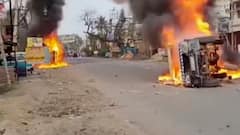Obituary: Buddhadeb Bhattacharjee — The Comrade 'Bhadralok' With Big Vision And Broken Dreams
Buddhadeb Bhattacharjee, former West Bengal CM, passed away on August 8. A key figure in CPM govt, he played a major role in Bengal's industrialisation. His death leaves a vacuum in Left politics.

What makes broken dreams so beautiful is the possibility of a new beginning. Broken dreams are not the end, but rather a new beginning.
Buddhadeb Bhattacharjee, a figure synonymous with the quintessential Bengali 'bhadralok' in his crisp dhoti-kurta and Kolhapuri slippers, dared to dream.
Throughout his life, however, he also amassed an equal amount of broken dreams. Perhaps it was because of these dreams and broken dreams that he remained a man with a broken heart.
Buddhadeb Bhattacharjee, a politician with rare personal integrity who served as the chief minister of West Bengal for 11 years, died on Thursday morning.
Eyesight Issues Forced Him To Give Up Cricket
Buddhadeb Bhattacharjee was born in Kolkata on March 1, 1944, though his ancestral home was in erstwhile Bangladesh. Upon passing out of Shailendra Sarkar School, in Shyampukur area of Kolkata, he went to Presidency College.
A nephew of Sukanta Bhattacharya, the young rebel poet who earned fame for his fiery writing against the estabishment and the powerful, Buddhadev did not initially participate in mainstream student politics. His interest lay in sports.
A kabaddi player once, he played cricket too, but eyesight issues forced him to give up cricket. However, his love for cricket did not fade. And that could be one of the reasons why he maintained close ties with Sourav Ganguly, who told Anandabazar Patrika Thursday the "sports crazy" leader never discussed politics with him.
CPM And Youth Movement, DYFI
Buddhadeb grew up in a family that believed in Left politics, and that definitely shaped his own politics.
Following the 1962 Sino-Indian War, the Communist Party of India (CPI) split in 1964 and the Communist Party of India (Marxist), also known as the CPM, became a new party. Buddhadeb joined the CPM two years later, in 1966. Until that point, he had been a Left-leaning student who experimented with different literary genres.
His primary role after joining the party was to write and edit the party newspaper. Buddhadeb rose during a significant rift in Left-leaning student politics over the issues of armed struggle and cultural revolution, with leaders such as Shaibal Mitra-Azizul Haque taking a different track. His first assignment was to lead the organising team for the youth movement. The CPM then launched its youth organisation.
Buddhadeb joined the Democratic Youth Federation of India (DYFI) in the late 1960s and was elected secretary of the West Bengal State Committee. During the Vietnam War, he actively participated in anti-American campaigns. He worked to strengthen the organisation, primarily in the Kolkata district, during the 1970s. Though he travelled to speak in rural Bengal for the party's needs, his activities at the time were centered in Kolkata. He felt at ease among the group of Left-leaning thinkers.
First And Last Election
Around the beginning of the 1970s, Buddhadeb joined the CPM's West Bengal State Committee. He won the Kashipur assembly constituency's first election in 1977 and held the position of information and public relations minister in the West Bengal State Cabinet from 1977 to 1982. The department later became 'Information and Culture'.
In the assembly elections of 1982, Buddhadeb lost. In 1987, he won from Jadavpur and was appointed minister of information and culture. Jadavpur had been his seat since, until 2011, when the same centre rejected him. The 34 long years of Left Front rule came to an end in the state that year.
Buddhadeb As West Bengal CM
Buddhadeb oversaw crucial ministries, like home affairs, in his predecessor Jyoti Basu's cabinet, in addition to information and culture. The police department was under him.
Buddhadeb had been a guest member of the CPM Central Committee since 1984. From 1985, he also served as a member of the Central Committee. He joined the Politburo in 2000 after being appointed as the deputy chief minister of West Bengal in January 1999.
Jyoti Basu retired on November 6 the same year, and Buddhadev took over as the chief minister of West Bengal, holding that position until 2011.
CM Buddhadeb Vs Mamata Banerjee
In the 2001 assembly elections, many believed Mamata Banerjee, the leader of the opposition, had "wind in her sails". However, the Left Front, headed by Buddhadeb, was re-elected. The following election, in 2006, saw the Left Front win 235 out of 294 seats. Once again, Buddhadev took oath as CM.
On the same day, Buddhadeb announced the Tata Group's plan to industrialise the state, and said Tata will build its "Rs 1 lakh car" factory in Singur.
He faced the first wave of opposition a few days later, when villagers demonstrated their disapproval when Tata representatives visited Singur.
Ultimately, a Tata Nano plant in Singur never became a reality. In response to criticism from opponents, including Mamata, Ratan Tata ultimately declared that he was shutting down the Singur project.
Buddhadeb was serious about the industrialization of the state, and wanted to achieve that as soon as possible. "Agriculture is our base, industry is our future" was his government's slogan at the time.
However, his efforts in Singur and Nandigram backfired, and his government drew the allegations of "forced' acquisition of agricultural land", which ultimately became the source of all political complications for the CPM in Bengal.
How Nandigram-Singur Backfired
In Nandigram, the police opened fire on March 14, 2007. The conflict claimed the lives of 14 villagers. That was the beginning of the end of the CPM government and Buddhadeb's political career.
In the 2008 panchayat polls, the Left Front experienced a narrow defeat, two years after a one-sided victory in the 2006 assembly polls.
Opposition Trinamool took control of the district councils in East Mednipur and South 24 Parganas. Though the Left Front prevailed in North 24 Parganas and Nadia, it did not take the Trinamool to close the gap.
In the Lok Sabha elections of 2009, the surprise was even bigger.
The Left Front lost 27 of the 42 seats. Trinamool won 19, and its support helped SUCI win an additional seat.
The state soon started to spiral out of control for Buddhadeb's administration.
He found himself alone, deserted by many of his party colleagues, grassroots workers and supporters, as a spree of defection started and the Left Front continued to bleed.
Finally, the state swung, bringing a new party to the helm.
The Congress-Trinamool alliance, led by Mamata Banerjee, defeated the Left Front, led by Buddhadeb. The 34-and-a-half-year Left Front regime was over.
Buddhadeb had been invited to CM Mamata's swearing-in ceremony at Raj Bhavan, but he declined the invitation.
Resignation And Loss Of Power
Buddhadeb had believed in his industrialisation policy, but it was questioned by his own party.
Following his resignation, he presented relevant documents before the CPM and declared that his government's industrialisation policy was correct. At the time, there was also a demand for land acquisition for industry.
He claimed that this process was inevitable and that the Singur-Nandigram incident was only an "exception". There were some administrative and political errors, he admitted, and asked the party to "learn from the exceptions". It was his firm belief that industrialisation could not be stopped.
However, the killing of villagers in Nandigram had a profound effect on Buddhadeb. Speaking at a public meeting, he accused himself of being "responsible" for the incident. During a 2013 interview also, Buddhadeb expressed regret for the Nandigram shooting.
Rejected Padma Bhusan
Following his defeat in the 2011 election, Buddhadeb's health began to deteriorate. He started to disappear from the party activities.
However, he would still visit the Alimuddin Street office of the party, primarily for academic purposes, even after his ouster. That also eventually stopped.
His eyesight was deteriorating, and his body was gradually breaking down. The complication of breathlessness reappeared, which required multiple hospital stays.
Buddhadeb, an avid reader, penned numerous plays and essays during his lifetime. He also translated poems and other writings from other countries.
Among other works, he translated legendary Colombian writer Gabriel García Márquez's 'The Story of a Shipwrecked Sailor'.
In his Bangla book, "Swarger Neeche Maha Bishrinkhala (Great Chaos Under Heaven)", he even criticised China for one of its latest policies.
Buddhadeb was personally connected with a number of well-known national and international cultural figures. He would have direct communication with the leaders of main opposition political parties. The central government nominated Buddhadeb for the Padma Bhushan in 2022, but he turned it down.
Buddhadeb had this quintessential Bengali ‘bhadralok’ image that he carried with him till the end, an image that stayed clean despite the various controversies surrounding him and all the stains his Left party suffered during its 34-year rule in West Bengal.
Breathed Last In His 2-Room Appartment
He lived in a modest two-room, 770-square-foot flat in south Kolkata’s Palm Avenue, a house he never left even after becoming the CM. Family members insisted, and officials in charge of security wanted him to move out, but he remained firm.
COPD has prevented him from flying since 2010. That's the reason why, during his tenure with Politburo and the party's central committee, Buddhadeb did not attend meetings held outside the state. In later years, he started to travel with an oxygen cylinder, and was under strict monitoring at home. He was last seen in public at a Left Front Brigade rally in 2019.
In the run-up to the 2024 Lok Sabha elections, the CPM shared a Buddhadeb video generated using artificial intelligence. The ailing former CM could be seen urging people to vote for the Left and secular forces.
Buddhadeb was in charge when the Leftist political system collapsed in Bengal. He was the main character during that "betrayal" phase, in a sense. But Buddhadeb Bhattacharjee's image of an "honest" politician remained unscathed, and he will live on in the collective memory of Bengal.


































